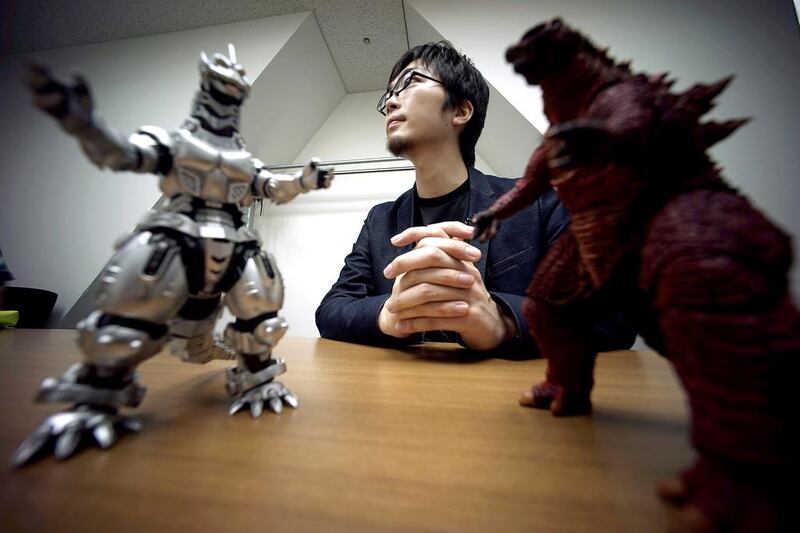Most of the godzillas we’ve seen, including last year’s Hollywood version, stomp on buildings, thrashing about and breathing fire. And we’ll see more of that in a video game going on sale globally in mid-July. But don’t expect any references to radiation – the mutant reptile’s trademark affliction.
Simply named Godzilla, it's the first videogame devoted to the irradiated creature in a decade. It's also the first such game for the Sony Corp PlayStation 4 home machine, ensuring dazzling digital graphics.
Shunsuke Fujita, the game’s producer, is flush with excitement when he speaks about how he and his team are true Godzilla believers, having grown up on the movies. They were very careful to render what he calls its “totally cool” ferocity.
In the original 1954 movie, Toho Co studios concocted the giant animal that arose as a mutation from nuclear testing in the Pacific. That had special resonance in Japan because it is the only country to have been attacked with nuclear weapons.
Gareth Edwards, the director of 2014's Godzilla, also made a point to include backdrop references to atomic weapons and radiation.
But the new game steers clear of the horror of both topics and Fujita is reluctant to explain why. What substitutes for radiation in the game is a reference to “energy”, which Godzilla sucks up to gain strength.
“We realise radiation is something that can never be disassociated with Godzilla,” is all Fujita will say on the topic.
Nuclear issues have become particularly contentious in Japan after the March 2011 tsunami caused three reactor meltdowns at the Fukushima Daiichi power plant and irradiated the surrounding area, forcing thousands of residents to evacuate.
Residents of Fukushima face latent prejudice in Japan because of fears, some unfounded, about radiation. Nuclear experts say the levels of exposure were not high or sustained enough to cause widespread health problems, but that there are some risks, such as the thyroid cancer in youngsters, which is being monitored.
Japan’s 48 nuclear power reactors are now offline for a new system of safety checks. The government wants to restart them, but faces opposition from communities and others worried about radiation.
“We aimed for something that was as close to the original interpretations as possible,” says Fujita, 29, proudly showing how the 1980s Godzilla can be pitted against the Hollywood Godzilla in a demonstration-version of the game.
The fascination for the game developers lay in an arty duplication of the shapes and movements of the various Godzillas, and in recreating the rival monsters in the films, such as the dragon-like King Ghidora, Mothra, which resembles a moth, and the obscure Jet Jaguar, according to Fujita.
“Godzilla is not just a villain, it’s also a hero everyone adores, and so this game allows the player to be Godzilla and control Godzilla,” he says.
Toho Co made 28 films in the Godzilla series, starting from the 1954 classic, until it pulled the plug in 2004. The new game allows players to manipulate the various Godzillas, including the robotic Mechagodzilla that was first featured in the 1974 film.
Meanwhile, there has been a visible resurgence of interest in Godzilla in Japan, thanks to the Hollywood film. A new hotel in downtown Tokyo with a Godzilla head perched on it, for instance, is becoming a popular tourist attraction.
Man Izawa, 56, a sales clerk and Godzilla fan, who believes Godzilla is “the biggest star to come out of Japan”, wonders how the sensitive themes will get addressed when Toho releases a new Godzilla film next year.
“It will be the first Japanese Godzilla after 3.11,” he says, referring to the widely used term for the Fukushima disaster.
Decommissioning the Fukushima reactors is expected to take about half a century and scientists are only starting to examine what state the melted cores might be in.
Izawa doesn’t blame people who want to avoid controversy in a game, which could crimp sales, but he marvels at the courage of the first Godzilla film that wasn’t afraid to take a stand on nuclear weapons, barely a decade after the end of the Second World War and the atomic bombings of Hiroshima and Nagasaki.
“The appeal of Godzilla can’t be easily explained in words. It’s not just about being scary and strong. It’s also about its ambience, its shape, its beauty, like being in awe of a samurai castle,” says Izawa.
Fujita is confident the game will be a hit with fans.
“This is a game made by people who love Godzilla, in which the love for Godzilla has gone wild. I know people who love Godzilla will feel that love.”
* AP





